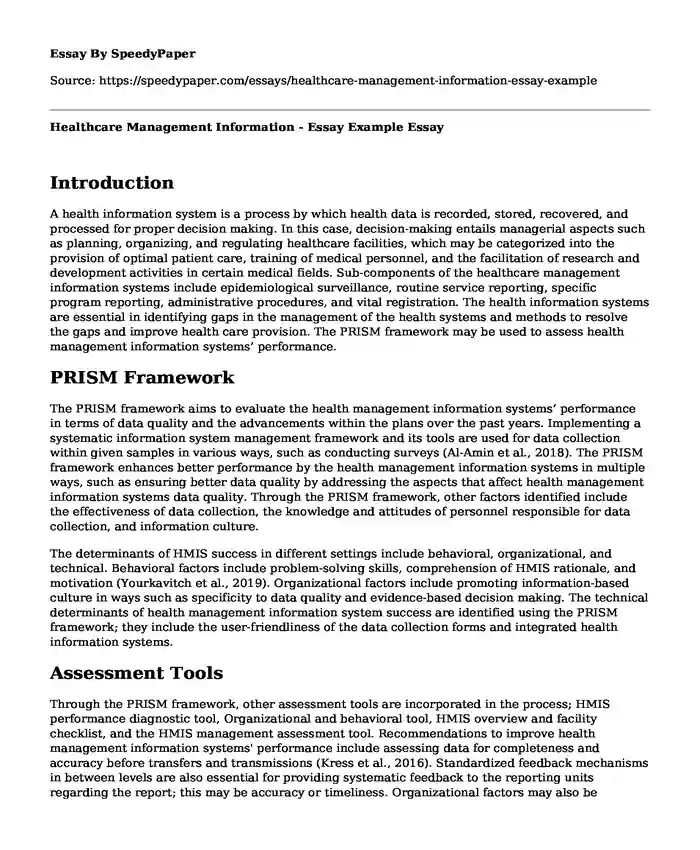
| Type of paper: | Essay |
| Categories: | Management Data analysis Medicine |
| Pages: | 3 |
| Wordcount: | 587 words |
Introduction
A health information system is a process by which health data is recorded, stored, recovered, and processed for proper decision making. In this case, decision-making entails managerial aspects such as planning, organizing, and regulating healthcare facilities, which may be categorized into the provision of optimal patient care, training of medical personnel, and the facilitation of research and development activities in certain medical fields. Sub-components of the healthcare management information systems include epidemiological surveillance, routine service reporting, specific program reporting, administrative procedures, and vital registration. The health information systems are essential in identifying gaps in the management of the health systems and methods to resolve the gaps and improve health care provision. The PRISM framework may be used to assess health management information systems’ performance.
PRISM Framework
The PRISM framework aims to evaluate the health management information systems’ performance in terms of data quality and the advancements within the plans over the past years. Implementing a systematic information system management framework and its tools are used for data collection within given samples in various ways, such as conducting surveys (Al-Amin et al., 2018). The PRISM framework enhances better performance by the health management information systems in multiple ways, such as ensuring better data quality by addressing the aspects that affect health management information systems data quality. Through the PRISM framework, other factors identified include the effectiveness of data collection, the knowledge and attitudes of personnel responsible for data collection, and information culture.
The determinants of HMIS success in different settings include behavioral, organizational, and technical. Behavioral factors include problem-solving skills, comprehension of HMIS rationale, and motivation (Yourkavitch et al., 2019). Organizational factors include promoting information-based culture in ways such as specificity to data quality and evidence-based decision making. The technical determinants of health management information system success are identified using the PRISM framework; they include the user-friendliness of the data collection forms and integrated health information systems.
Assessment Tools
Through the PRISM framework, other assessment tools are incorporated in the process; HMIS performance diagnostic tool, Organizational and behavioral tool, HMIS overview and facility checklist, and the HMIS management assessment tool. Recommendations to improve health management information systems' performance include assessing data for completeness and accuracy before transfers and transmissions (Kress et al., 2016). Standardized feedback mechanisms in between levels are also essential for providing systematic feedback to the reporting units regarding the report; this may be accuracy or timeliness. Organizational factors may also be considered for improving HMIS performance by promoting information-based cultures; training may also be conducted to the health facility staff.
Conclusion
Conclusively, healthcare management information systems may be assessed for performance by using the performance of routine information management system. However, other assessment tools may be used in combination with the PRISM framework, such as organizational and behavioral tools. Determinants to the success of an HMIS in varying settings include administrative, behavior, and technical aspects. Recommendations for improving a healthcare management information system's performance include increasing data accuracy and performing healthcare personnel training.
References
Al-Amin, M., Schiaffino, M. K., Park, S., & Harman, J. (2018). Sustained hospital performance on hospital consumer assessment of healthcare providers and systems survey measures: what are the determinants?. Journal of Healthcare Management, 63(1), 15-28.
Kress, D. H., Su, Y., & Wang, H. (2016). Assessment of primary health care system performance in Nigeria: using the primary health care performance indicator conceptual framework. Health Systems & Reform, 2(4), 302-318.
Yourkavitch, J., Prosnitz, D., & Herrera, S. (2019). Data quality assessments stimulate improvements to health management information systems: evidence from five African countries—Journal of Global Health, 9(1).
Cite this page
Healthcare Management Information - Essay Example. (2023, Dec 25). Retrieved from https://speedypaper.com/essays/healthcare-management-information-essay-example
Request Removal
If you are the original author of this essay and no longer wish to have it published on the SpeedyPaper website, please click below to request its removal:
- Healthcare Essay Example: Hourly or Intentional Rounding for Patients' Safety
- Ethics Essay Example: All Abortions Are Selfish
- Essay Sample. Employees' Social Media Use: Problem at Workplace
- Free Essay: Texas Should Legalise the Medical and Recreational Use of Marijuana
- Social Media: Uniting and Disseminating Info in the Digital Age - Essay Sample
- Idiopathic Pulmonary Fibrosis - Free Essay Example
- Free Essay: Healthcare in Australia
Popular categories




